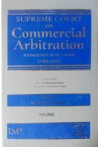
- Author(s): R. Venkataramani, Manoj Kumar
- Publisher: Corporate Law Adviser
- Edition: Ed 2023
- ISBN 13 9789384345402
- Approx. Pages 4454 + Contents
- Format Hardbound
- Approx. Product Size 24 x 18 cms
- Delivery Time 3-5 working days (within Kerala & South India) (Others 7-9 days)
- Shipping Charge Extra (see Shopping Cart)
......................................................................................................................................
Description
Arbitration in India was statutorily recognized with the enactment of the Indian Arbitration Act, 1899 which was confined to the three presidency towns namely Madras, Bombay and Calcutta. Subsequently it was further codified in Section 89 and Schedule II of the Code of Civil Procedure, 1908, where Provisions of Arbitration was further extended to different regions of British India. The Act of 1899 together with the provisions of the CPC, 1908 were found to be less expedient and more technical and thus, the Arbitration Act, 1940 came into existence and repealed the Act of 1899 along with the relevant provisions of the CPC, 1908. Following the economic liberalization in the year 1991, further steps were taken to attract foreign investments which required a comfortable business environment and ease of doing business. To this end, the Arbitration and Conciliation Act, 1996 came into force and repealed the Act of 1940.The Act of 1996 was based on UNCITRAL Model Law on International Commercial Arbitration, 1985 and covered both domestic and international arbitration. The main reason for introducing the Act of 1996 was to curb delays in arbitration. To keep pace with the rapid pace of development, evolving dynamics of doing business and to ensure speedy resolution of the disputes, the Act of 1996 was amended by the Arbitration and Conciliation (Amendment) Act, 2015. Though the Amendments of 2015 addressed a large number of issues in the arbitral process, lack of institutional arbitration culture in the country still remained as an impediment to make Arbitration the most preferred mode of dispute resolution in India. Thereafter, on 13th January, 2017 a High-Level Committee headed by Justice B.N. Srikrishna, Retired Judge, Supreme Court of India, was constituted to Review the Institutionalisation of Arbitration Mechanism in India. Following the suggestions made by the Committee in its report submitted on 9th August, 2019, the Act of 1996 was further amended by the Arbitration and Conciliation (Amendment) Act, 2019 and the Arbitration Council of India (ACI) was introduced whose main task was to promote and encourage ADR in the Country, grade the arbitral institutions and arbitrators in the country, and help in boosting institutional arbitration in India.
......................................................................................................................................
Table of Contents
Volume 1
Cases Pertaining to Year
Section I Full Reports
1988
1989
1990
1992
1994
1996
1997
1998
1999
2000
2001
2002
2003
2004
2005
2006
Volume 2
Cases Pertaining to Year
2007
2008
2009
2010
2011
2012
2013
2014
2015
Volume 3
Cases Pertaining to Year
2016
2017
2018
2019
2020
2021
2022
Section II Short Rulings
Cases Pertaining to Year
1989
1990
1991
1992
1993
1994
1995
1996
1997
1998
1999
2000
2001
2004
2006
2007
2008
2009
2011
2012
2014
2019
......................................................................................................................................
Author Details
Foreword by
R. Venkataramani Attorney General for India
Curated by
Dr. Manoj Kumar
